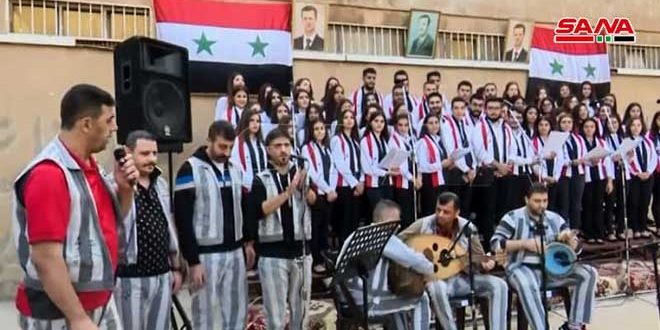The cultural centers promote self-examination and self-esteem of prisoners through participation in visual arts classes, exhibitions and publications and bring the talent and creativity of the prison population to the community at large.
The cultural centers are a vital tool in aiding inmates to use their sentenced time constructively by provoking them to develop their self-discipline, self-esteem, work ethic, and interpersonal and communication skills while they examine their lives and the actions which led to their incarceration .
The cultural centers in the prisons of Damascus and the governorates form a bridge of communication for the prison inmates with the outside world and encourages them to continue their education, raising their awareness and teaching them many arts.
This initiative was launched in September 2017, when the Ministries of Interior and Culture signed a memorandum of understanding with the aim of employing various cultural factors such as cinema, book and theater to consolidate concepts of dialogue and acceptance of the other, especially in prisons and various educational facilities, and directing the tools of cultural action towards strengthening the spirit of citizenship and overcome the repercussions of the crisis.
 The initiative took effect a year after the signing of the memorandum of understanding, when the Ministry of Culture, in cooperation with the Ministry of Interior, opened two cultural centers and two folk culture institutes in the men’s and women’s sections in “Adra” Central Prison in addition to two new cultural centers in Homs and Tartous prisons.
The initiative took effect a year after the signing of the memorandum of understanding, when the Ministry of Culture, in cooperation with the Ministry of Interior, opened two cultural centers and two folk culture institutes in the men’s and women’s sections in “Adra” Central Prison in addition to two new cultural centers in Homs and Tartous prisons.
These cultural centers offer cultural activities to prison inmates including literacy courses, organize art exhibitions, and theatrical and cinematic performances, and provided their libraries with thousands of titles from the publications of the Ministry of Culture and the Syrian General Organization of Book .
 Mr. Bassam Dayyoub , Director of Adult Education and Cultural Development at the Ministry of Culture, said in a statement to SANA that these centers are part of a plan that seeks to rehabilitate prison inmates in the hope of bringing about the hoped-for change in the knowledge structure and reintegrating them into the national social society upon their release.
Mr. Bassam Dayyoub , Director of Adult Education and Cultural Development at the Ministry of Culture, said in a statement to SANA that these centers are part of a plan that seeks to rehabilitate prison inmates in the hope of bringing about the hoped-for change in the knowledge structure and reintegrating them into the national social society upon their release.
Dayyoub stressed “Our work in these cultural centers is doubled, given the need of these people more than others,” explaining that the centers’ plan inside prisons, and their activities and events are not different from those in any cultural center outside , but they focus on the societal and legal aspects that deal with inmates’ affairs, including awareness seminars on the danger of criminal and electronic crime, in addition to practical lectures on health and medical fields delivered by specialized doctors.
The implementation of this initiative, according to the Director of the Prisons Department at the Ministry of Interior, Major General Jassem Al-Hamad, comes as a need and a necessity.It helps in the rehabilitation of the prison inmates in order to enable them to harmonize with the rest of society and take their role as active and optimistic individuals looking for the best way to support their families.
Regarding the upcoming procedures to activate the role of these centers, Brigadier General Moqbel Al-Homsi, head of the Damascus Central Prison branch, said that work is underway to develop these centers in terms of capabilities and highlight the importance of integrating inmates into society.
He pointed out that “ a number of steps are carried out to take care of their psychological, scientific, rehabilitation, training and education affairs that increase their activity and constitute an incentive for them to start their lives again”.
Rawaa Ghanam

